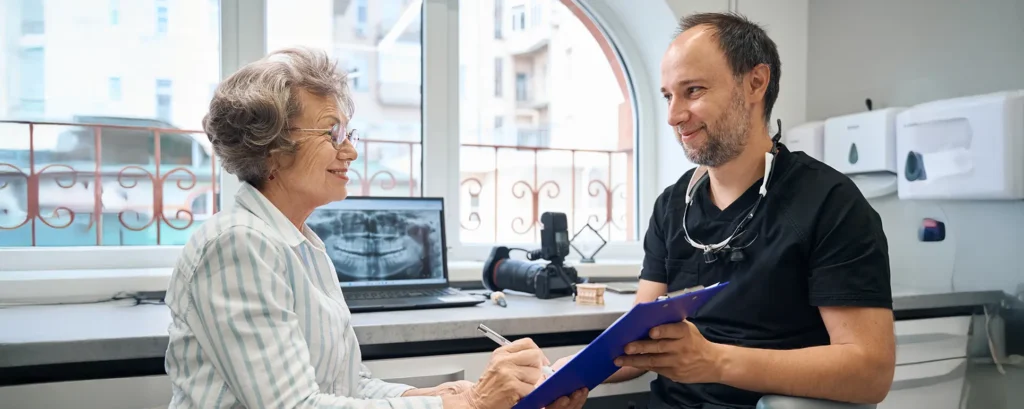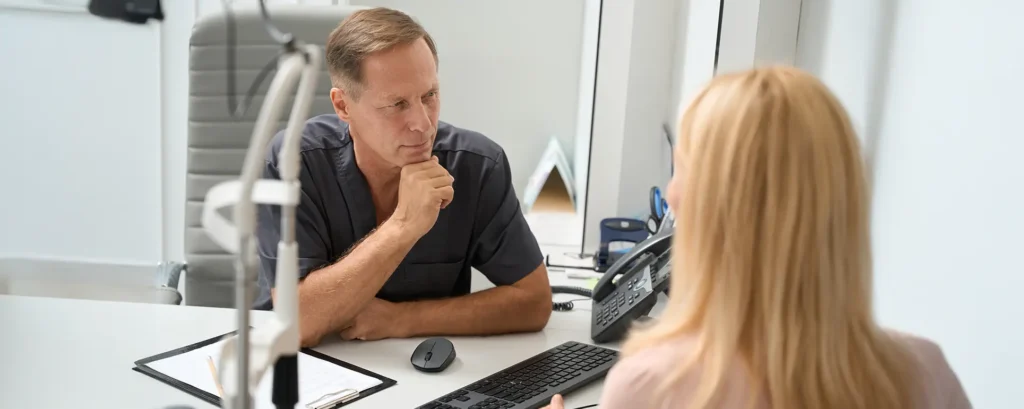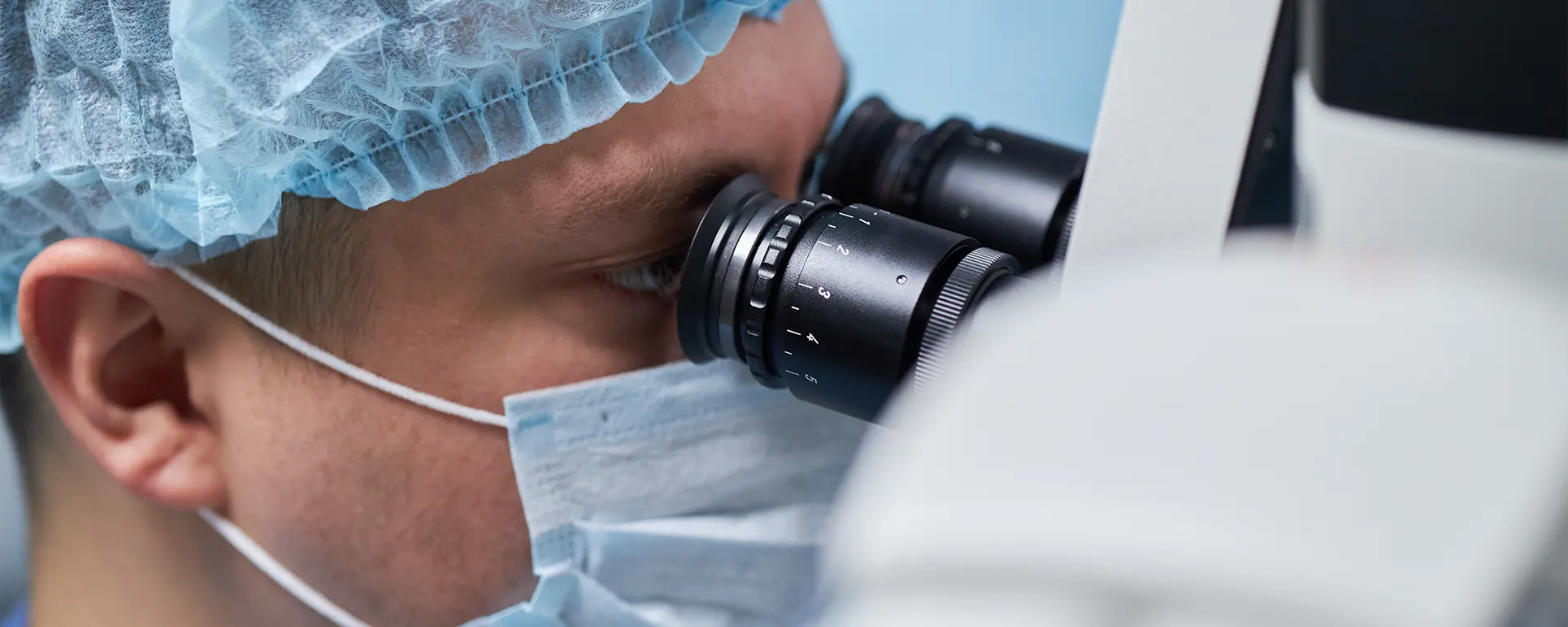When you’re preparing for cataract surgery, most people focus on the actual procedure itself. But what happens after the operation is just as important. The aftercare you receive can influence how smoothly you recover, how comfortable your vision feels in the weeks that follow, and how quickly any complications are spotted and dealt with. This is where you’ll notice clear differences between NHS care and private treatment.
In the UK, the NHS provides high-quality cataract surgery to millions of people every year, but the aftercare pathway is structured in a way that focuses on efficiency and making best use of limited resources. Private clinics, on the other hand, often highlight their more personalised follow-up systems and easier access to your surgeon. Neither is inherently “better” in every sense, but the experience will feel quite different depending on which option you choose.
So, if you’re weighing up whether to have your cataract surgery on the NHS or privately, it helps to know what sort of aftercare you’ll receive in each setting. Let’s walk through the key differences, step by step, so you know exactly what to expect.
NHS Cataract Surgery Aftercare
When you have cataract surgery on the NHS, the follow-up care is designed around large patient numbers and the need for efficient, standardised pathways. This usually means that once your operation is completed, you will not automatically see the same surgeon again. Instead, follow-up appointments may be handled by nurses, optometrists, or ophthalmic technicians within the hospital or a community clinic.
The standard NHS protocol usually includes one follow-up visit. This might take place around four to six weeks after your surgery, and the aim is to check that your eye is healing properly and that your vision is stable enough for new glasses if required. If any issues come up before that, you can contact the hospital eye department, but you may not get an appointment straight away unless the problem is considered urgent.
This structured approach works very well for many patients. Most people heal without problems, and the NHS pathway is more than enough to keep an eye on recovery. However, if you’re someone who feels more comfortable knowing you can quickly access your surgeon with questions, you may find the NHS route a little less reassuring.
Private Cataract Surgery Aftercare

Private cataract surgery aftercare looks and feels quite different. Clinics usually emphasise a much more personal service, with direct access to your consultant throughout the process. After surgery, you’re often given a 24/7 contact number in case of concerns, and you can expect more than one routine follow-up visit.
The first check is usually within the first few days after surgery, sometimes even the next day. This allows the surgeon to confirm that your eye pressure is stable, the lens implant is well positioned, and there are no early signs of complications. A second follow-up typically happens around one to two weeks later, with another at four to six weeks to finalise your prescription for glasses if needed. Some clinics even include extra visits as part of the package, especially if you’ve chosen premium lenses such as multifocals or torics, where outcomes may need closer fine-tuning.
One of the biggest advantages in the private setting is continuity of care. You are far more likely to be seen by the same consultant who performed your surgery, rather than a nurse or technician. This can feel reassuring, especially if you value building a relationship with your surgeon and want direct answers about your progress.
How Many Follow-Up Appointments Can You Expect?
The difference in the number of follow-up appointments is one of the most noticeable contrasts between NHS and private cataract surgery. On the NHS, the norm is a single post-op check unless complications arise. In some areas, this might even be carried out by your local optician rather than within the hospital.
By contrast, private clinics often offer multiple scheduled checks as standard. Not only does this provide peace of mind, but it also increases the likelihood that any subtle changes in your healing are spotted early. For patients with complex eyes or those who have chosen advanced lenses, this extra attention can make a meaningful difference to the final visual outcome.
Of course, more appointments aren’t always necessary for everyone. Most patients heal well after cataract surgery regardless of the setting, but if you are the type of person who prefers more contact and reassurance, this can be an important factor to consider.
Access to Your Surgeon

Another key difference lies in how easily you can speak to the person who performed your surgery. With the NHS, you may not see your consultant again once your procedure is complete. Any follow-up care is often delegated to other professionals, which helps the system run efficiently. If complications occur, you can be escalated back to the consultant team, but this is usually through referral rather than direct contact.
Privately, direct access is part of the package. Many consultants provide their personal email or phone line for urgent concerns, and clinics often have staff available around the clock. Being able to speak to the surgeon who knows your eyes can be a major source of reassurance. It also means that if adjustments need to be made, decisions can be taken more quickly.
This difference can be especially important for patients who are anxious about surgery, have complex eye conditions, or simply want the confidence of knowing their surgeon is available if needed.
Managing Complications
Cataract surgery is one of the safest operations performed today, but like any medical procedure, it does carry risks. The way complications are managed depends on the aftercare structure.
On the NHS, urgent issues such as pain, loss of vision, or sudden redness are treated quickly, but you may need to go through the hospital eye emergency clinic rather than seeing your original surgeon directly. For most patients, this system works well, but it can feel less personal.
Private clinics usually encourage patients to contact them immediately if they are worried, no matter how small the concern. Because the number of patients is smaller, and because surgeons often limit their caseloads in private practice, they can typically respond faster and provide direct guidance. In rare cases of serious complications, private clinics will also work with NHS hospitals if advanced facilities are required, so you are not left without support.
Glasses and Prescription Checks
Another aspect of aftercare is how your prescription for glasses is handled. After cataract surgery, your eyes need time to settle before new lenses are prescribed. On the NHS, this is usually addressed at your four-to-six-week follow-up appointment. An optometrist will check your vision and, if necessary, provide a prescription for new glasses.
In private care, the process is similar but often includes more detailed checks, especially if you’ve chosen premium intraocular lenses designed to reduce dependence on glasses. Some clinics even include the cost of post-surgery glasses in their package, though this varies. More importantly, the surgeon themselves may be involved in checking your prescription and ensuring the chosen lens outcome matches your lifestyle needs.
Psychological Reassurance and Patient Experience
Aftercare isn’t just about the clinical checks – it’s also about how you feel during recovery. For some people, knowing they can only contact the hospital if something seems urgent is enough. For others, especially those who feel anxious, the more frequent follow-ups and open lines of communication in private care make a big difference to peace of mind.
The NHS focuses on treating large numbers of patients effectively, while private clinics often market themselves as offering a more “handheld” journey. Neither approach is wrong, but they cater to different expectations. If you’re someone who prefers reassurance at every step, the private model might suit you better.
Cost vs Value of Aftercare

One of the big questions patients ask is whether the additional private aftercare is worth the cost. NHS surgery is free at the point of care, which is a huge advantage, especially when most patients recover smoothly without complications.
Private surgery, however, can cost several thousand pounds, and part of that fee covers the extended aftercare service. You’re not just paying for the operation itself but also for the personalised follow-up, faster access to care, and direct communication with your surgeon.
It’s worth thinking about what matters most to you. If your main priority is cost-effectiveness and you’re confident with a more standardised follow-up, the NHS route makes perfect sense. If you want more frequent checks and easier access to your surgeon, then the private route may justify the expense.
FAQ Section
- Do you always get a follow-up appointment after NHS cataract surgery?
Yes, most NHS patients will be given one follow-up appointment about four to six weeks after surgery. This appointment is often with an optometrist or nurse rather than your surgeon, and it focuses on checking that the eye has healed and whether you need a new glasses prescription. - Will I see my surgeon again after NHS cataract surgery?
In most NHS settings, you won’t automatically see your operating surgeon again unless complications arise. Follow-up care is usually provided by other members of the eye care team, which allows consultants to focus on carrying out more surgeries. - How soon is the first follow-up appointment after private cataract surgery?
Private clinics often arrange a first check within 24 to 72 hours of surgery. This early review ensures that your eye pressure is stable, the new lens is in the right position, and there are no early complications that require intervention. - What happens if I have a complication after NHS cataract surgery?
If you develop symptoms such as pain, redness, or sudden vision loss, you will need to contact the hospital eye department or attend the emergency eye clinic. You may not see your original surgeon, but you will be assessed by an ophthalmologist who can manage the issue appropriately. - What happens if I have a complication after private cataract surgery?
Private patients are usually encouraged to call their surgeon or clinic directly if they are worried. Because private clinics deal with fewer patients, you will often be seen quickly, and your original surgeon may personally review and manage the situation. - Can NHS cataract surgery patients access their surgeon directly?
Direct access to your consultant is uncommon within the NHS pathway. Instead, you contact the hospital eye service and are triaged to the right level of care. Urgent cases are prioritised, but routine queries are usually handled by nurses or optometrists. - Does private cataract surgery always include multiple follow-ups?
Yes, most private clinics offer at least two or three follow-ups as part of the package. These are built into the cost of surgery and are designed to provide more detailed checks and reassurance throughout recovery. - Will my optician be involved in aftercare?
Yes, in many NHS areas, opticians play an important role in aftercare. You may be referred to your local optometrist for your four-to-six-week check. Private patients may also have their final glasses prescription checked by an optician, though the surgeon is often more directly involved. - Are private aftercare packages covered by insurance?
Some health insurance policies cover cataract surgery, including the aftercare that comes with it. However, you should check the details of your policy, as not all insurers provide full coverage for premium lenses or extended follow-up care. - Which type of aftercare is best for me?
The right aftercare depends on your needs and preferences. If you are confident with fewer follow-ups and want a cost-free option, the NHS pathway works very well. If you prefer closer contact, multiple reviews, and direct surgeon access, private aftercare may be a better fit.
Final Thoughts
Cataract surgery can transform your vision, but the journey doesn’t end once the operation is over — the aftercare is just as important. With the NHS, you can expect a streamlined system: a single follow-up appointment, efficient triage if problems arise, and excellent clinical standards. It’s a pathway designed to care for large numbers of people effectively.
Private cataract surgery offers something different. Multiple follow-up appointments, direct access to your surgeon, and a more personalised approach give you extra reassurance throughout recovery. This doesn’t mean the NHS pathway is lacking, but rather that the private model is tailored to patients who value ongoing contact and a closer relationship with their consultant.
Ultimately, the choice depends on what you want from your aftercare. If you’re comfortable with a straightforward process and trust the NHS system, you’ll still get excellent outcomes. If you prefer more detailed follow-up and personalised support, a private clinic may be a better fit.
At London Cataract Centre, we provide dedicated aftercare as part of every treatment package, giving you the peace of mind that your recovery is closely monitored from day one.

